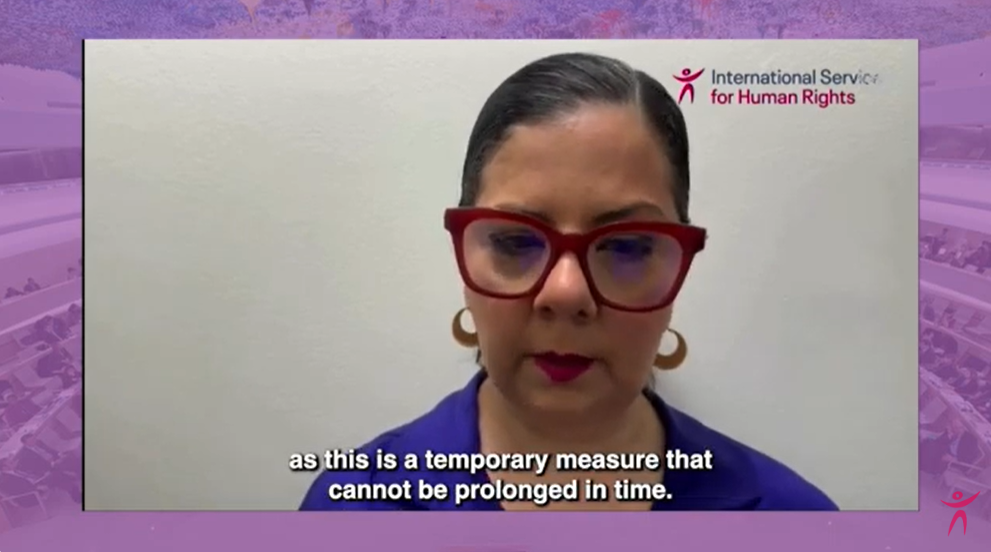Photo: UNWebTV

HRC59: Amidst ongoing state of emergency, El Salvador must review legality of mass detentions
Due Process Law Foundation and ISHR urge El Salvador to establish an expert commission to review mass detentions under the state of emergency, warning of continued rights violations and shrinking civic space under new repressive laws.
On 30 June, Leonor Arteaga, representative of Fundacion Para el Debido Proceso (DPLF), delivered a joint statement with ISHR for the adoption of El Salvador’s Universal Periodic Review (UPR). Arteaga urged the Salvadoran government to establish an independent commission of experts to review cases of detention and to end the state of exception. Watch Below:
El Salvador has been under an extended state of emergency since March 2022, initially enacted to address gang-related violence. Under this measure, more than 85,000 individuals have been arbitrarily detained, often without access to legal counsel, family visits, or basic judicial guarantees. The prolonged state of emergency has led to widespread human rights violations, including documented cases of torture, enforced disappearances, incommunicado detention, and deaths in custody. UN Special Rapporteurs and Human Rights Watch have highlighted that this extended state of emergency significantly undermines judicial protections, erodes democratic institutions, and creates an environment of impunity for rights violations committed by security forces.
Adding to these concerns, the recently enacted Foreign Agents Law imposes severe restrictions on civil society organisations and independent media by mandating their registration as ‘foreign agents,’ applying a punitive 30 percent tax on foreign funding, and establishing arbitrary oversight mechanisms. Passed without public debate by El Salvador’s Legislative Assembly, critics warn the law’s vague definitions and the broad discretionary powers granted to the Foreign Agents Registry (RAEX) heighten risks of persecution and intimidation against government critics. A coalition including Amnesty International, CEJIL, and ISHR has called on international bodies to urgently condemn the law, urge its repeal, and address democratic backsliding in El Salvador, comparing this process to similarly authoritarian laws in Russia, Nicaragua, and Venezuela, and warning these threaten the effective and long term functioning of CSOs, democratic freedoms, and fundamental rights.
We urge El Salvador to implement UPR recommendations it voluntarily accepted in these areas. Which included calls to ensure detainees’ access to legal counsel, the ability to appeal their detention, and alternatives to incarceration (124.32 – Belgium); uphold the right to a fair trial for all, including minors and those accused of gang affiliation (124.52 – Italy); and improving detention conditions in line with international standards (124.34 – Greece). An independent expert mechanism, such as the one proposed by DPLF, grounded in international best practices and standards, would be a concrete step toward restoring due process and adequate judicial oversight.
At the same time, we regret El Salvador’s refusal to accept recommendations to end the state of exception, an emergency measure now entering its fourth year. This moment must serve as a turning point. The Human Right Council should call on El Salvador to engage meaningfully with international mechanisms, reverse policies of mass detention, and reestablish democratic and human rights guarantees.
